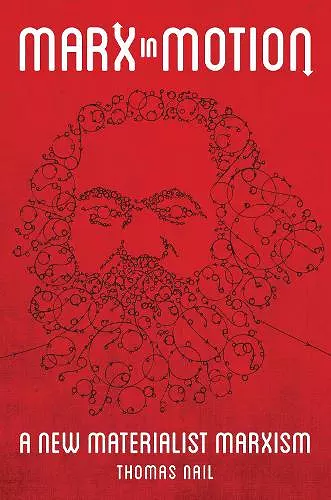Marx in Motion
A New Materialist Marxism
Format:Paperback
Publisher:Oxford University Press Inc
Published:17th Sep '20
Should be back in stock very soon
This paperback is available in another edition too:
- Hardback£88.00(9780197526477)

Karl Marx is the most historically foundational and systematic critic of capitalism to date, and the years since the 2008 financial crisis have witnessed a rebirth of his popular appeal. In a world of rising income inequality, right-wing nationalisms, and global climate change, people are again looking to the father of modern socialism for answers. As this book argues, every era since Marx's death has reinvented him to fit its needs. There is not one Marx forever and for all time. There are a thousand Marxes. As Thomas Nail contends, one of the most significant contributions of Marx's work is that it treats theory itself as a historical practice. Reading Marx is not just an interpretative activity but a creative one. As our historical conditions change, so do the kinds of questions we pose and the kinds of answers we find in Marx's writing. This book is a return to the writings of Karl Marx, including his under-appreciated dissertation, through the lens of the pressing philosophical and political problems of our time: ecological crisis, gender inequality, colonialism, and global mobility. However, the aim of this book is not to make Marxism relevant by "applying" it to contemporary issues. Instead, Marx in Motion, the first new materialist interpretation of Marx's work, treats Capital as if it were already a response to the present. Thomas Nail argues that Marx was a new materialist avant la lettre. He argues that Marx did not believe history was determined, or that matter was passive, or that humans were separate or superior to nature. Marx did not even have a labor theory of value. Marxists argue that new materialists lack a sufficient political and economic theory, and new materialists argue that Marx's materialism is human-centric and mechanistic. This book aims to solve both problems by proposing a new materialist Marxism.
Recommended. * P. Steiner, emeritus, University of Pennsylvannia, CHOICE *
Marx in Motion raises many important and interesting questions. * Boris Hennig, Monthly Review *
It is rare to find a genuinely novel reading of Marx and yet that is exactly what Thomas Nail provides in this remarkable book. In an ambitious, pathbreaking, and admirably lucid analysis, Nail offers us a 'new materialist' Marx that both resonates with ecological, feminist, and postcolonial Marxisms and suggests answers to some of the central political problems of our age. * Simon Choat, author of Marx Through Post-Structuralism: Lyotard, Derrida, Foucault, Deleuze *
Thomas Nail's Marx in Motion is the most penetrating account of the origins of Marx's overall philosophical outlook to appear this century. Relying on his extensive background in Epicurean philosophy, Nail explores the emergence of Marx's materialist dialectics and his ecological-metabolic views as these first appeared in nascent form in Marx's 1841 doctoral thesis on Epicurus. The result is a revolutionary understanding of Marx's historical ontology of motion, a whole new starting point for the philosophy of praxis. * John Bellamy Foster, author of The Return of Nature: Socialism and Ecology *
Why does Marx return in such a lively way after being banned from philosophical and political debate? Nail, who is an excellent reader of Lucretius, reminds us that Marxian thought finds its basis in the powerful ancient materialism. It is of that light that it shines. Beyond the positivist folklore of the Soviet Diamat, beyond the anthropocentric universalism of Marxist humanism after World War II, beyond the surrealist drift of post-structuralism, this book invites us to let ourselves be taken by the ancient materialist rhythm of Marxian concepts, and thus to accompany that philosophical return to political action. * Antonio Negri, co-author of Empire *
ISBN: 9780197526484
Dimensions: 231mm x 155mm x 23mm
Weight: 544g
264 pages